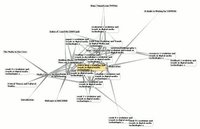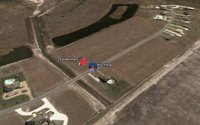theNetwork
 I forgot to mention, I found a neato webpage that allows you to visualize the network of links (a la google.com) coming from a site. And yes, it's stretchy and moves in that oh-so-satisfying java way. Also, try double clicking to expand the node out farther. I used the course blog page to give you an idea.
I forgot to mention, I found a neato webpage that allows you to visualize the network of links (a la google.com) coming from a site. And yes, it's stretchy and moves in that oh-so-satisfying java way. Also, try double clicking to expand the node out farther. I used the course blog page to give you an idea.http://www.touchgraph.com/TGGoogleBrowser.html
Second, I found a gem while looking up the del.isio.us link for the above site. Ha!
 It's a blog ( link) discussing google Earth's ability to geo-tag content. Then while you move around in the Google Earth application you can see content based upon it's tagged location. Flikr was what I check out, so you can see where photo were taken and it kind of serves as a close up (with personalization.) Let me try not to go into the possibilities... but imagine browsing a network of content based on geotagging. It's a whole other potential internet. A million photos of a landmark... a hundred blog entries about a restraunt.
It's a blog ( link) discussing google Earth's ability to geo-tag content. Then while you move around in the Google Earth application you can see content based upon it's tagged location. Flikr was what I check out, so you can see where photo were taken and it kind of serves as a close up (with personalization.) Let me try not to go into the possibilities... but imagine browsing a network of content based on geotagging. It's a whole other potential internet. A million photos of a landmark... a hundred blog entries about a restraunt.Plus, you can find places where nothing digital has happened and then escape to them.
